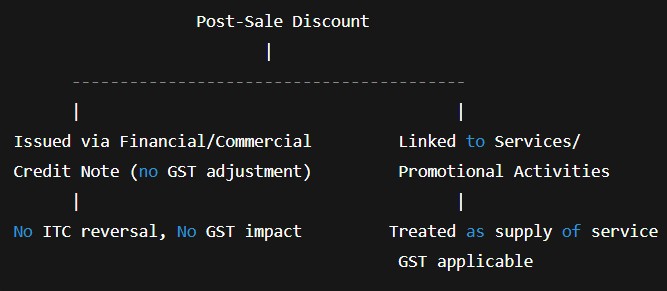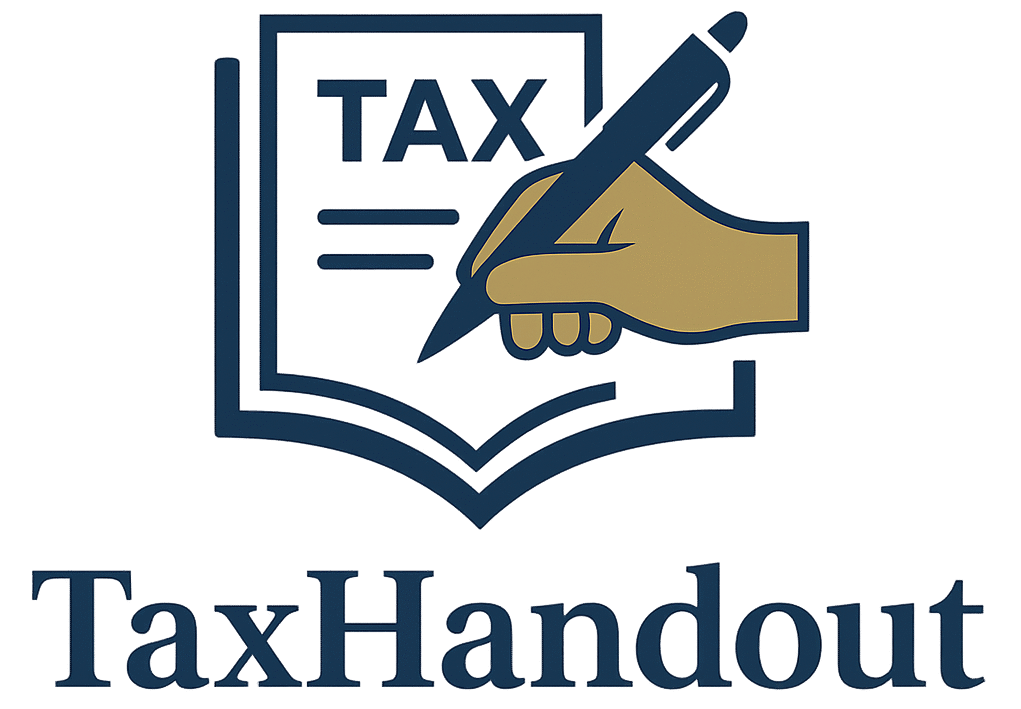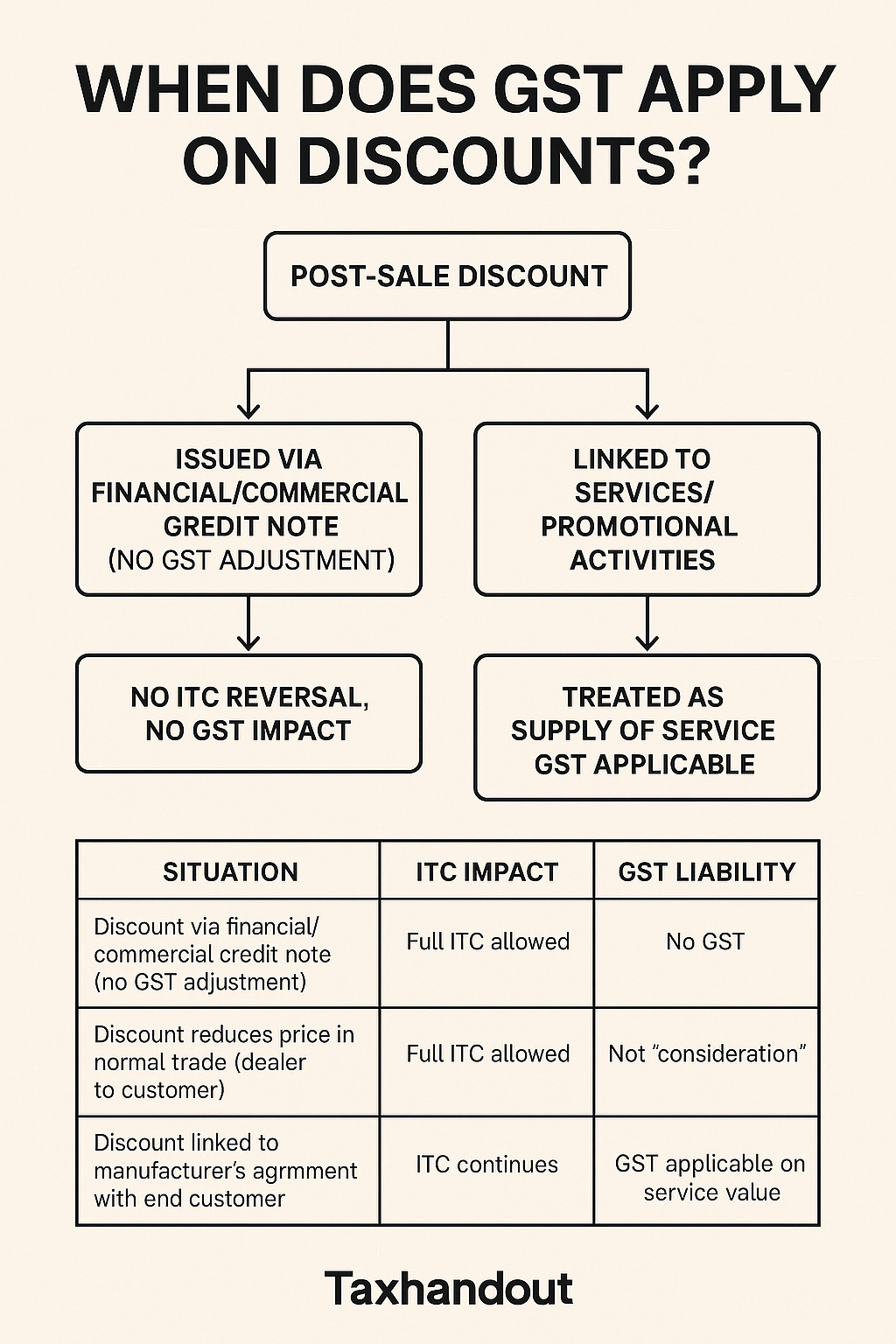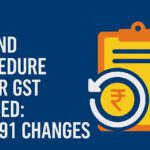On 12th September 2025, the Central Board of Indirect Taxes and Customs (CBIC) issued Circular No. 251/08/2025-GST to address doubts regarding the treatment of secondary or post-sale discounts under GST.
This circular builds upon earlier clarifications (like Circular 92/11/2019-GST) and provides much-needed clarity for manufacturers, distributors, dealers, and tax professionals.
In this Handout, we will cover:
- Meaning of secondary/post-sale discounts
- Treatment of Input Tax Credit (ITC)
- Whether such discounts are “consideration”
- Impact when linked to promotional services
- Practical examples, tabular comparison & flowcharts
- Key compliance takeaways
What are Secondary or Post-Sale Discounts?
- These are discounts given after the original supply is completed.
- Unlike trade discounts (shown on the invoice), these are usually issued through financial or commercial credit notes after the sale.
👉 Example: Manufacturer sells goods to a dealer at ₹10,00,000 + GST. Later, issues a ₹50,000 discount (without adjusting GST). This is a post-sale discount.
Issue 1: Availability of ITC to Recipient When Discounts Are Given
Clarification by CBIC:
- As per Section 16(1) of CGST Act, ITC can be availed on inputs used in business.
- When suppliers issue financial/commercial credit notes (not reducing tax liability), there is no reduction in transaction value.
Hence, recipient does not need to reverse ITC.
Example 1:
- Invoice: ₹1,00,000 + GST ₹18,000.
- Dealer avails ITC = ₹18,000.
- Supplier issues credit note ₹10,000 (without GST impact).
👉 Dealer continues to keep full ITC ₹18,000.
⚠️ Note: If the supplier issues a GST credit note under Section 34(1) with GST adjustment, then both supplier’s liability and recipient’s ITC reduce proportionately.
Issue 2: Post-Sale Discount as Consideration for Dealer’s Supply to End Customer
CBIC View:
- Section 2(31), CGST Act defines “consideration” to include any inducement for supply.
- But in normal trade practice, manufacturer → dealer → customer are two independent sales.
- Dealer sells on principal-to-principal basis; discounts are only to push sales, not for any independent service.
Example 2 (No GST Impact):
- Manufacturer sells to dealer @ ₹1,000/unit + GST.
- Dealer sells to customer @ ₹1,200/unit.
- Manufacturer issues discount of ₹100/unit later.
👉 This discount reduces dealer’s cost, not a consideration. No GST impact.
⚠️ Exception:
- If the manufacturer has an agreement with end customer to provide goods at a reduced price, and uses the dealer as a channel, then the discount becomes inducement and forms part of consideration.
Example 3 (GST Impact):
- End customer contract: Price = ₹900/unit.
- Dealer sells to customer @ ₹900/unit.
- Manufacturer reimburses dealer via discount ₹100/unit.
👉 This discount is inducement for dealer’s supply, hence part of consideration.
Issue 3: Discount vs Promotional Activities by Dealer
Clarification by CBIC:
- Normal discounts = Reduction in price = Not taxable.
- If dealer performs specific promotional services for manufacturer (ads, co-branding, exhibitions, customer campaigns, etc.), then it becomes supply of service, taxable under GST.
Example 4 (Not Taxable):
Manufacturer gives dealer a discount for achieving target sales volume.
👉 Just a price reduction. No GST.
Example 5 (Taxable):
Dealer runs a co-branded TV ad campaign for the manufacturer, cost reimbursed via discount.
👉 This is a service by dealer to manufacturer, GST is payable.
Flowchart: When Does GST Apply on Discounts?

| Situation | ITC Impact | GST Liability |
| Discount via financial/commercial credit note (no GST adjustment) | Full ITC allowed | No GST |
| Discount reduces price in normal trade (dealer to customer) | Full ITC allowed | Not “consideration” |
| Discount linked to manufacturer’s agreement with end customer | Full ITC allowed | May be treated as “consideration” |
| Dealer provides promotional activities (ads, branding, events) | ITC continues | GST applicable on service value |
Key Compliance Takeaways
- Dealers can keep full ITC when suppliers issue commercial/financial credit notes without GST adjustment.
- Normal trade discounts do not attract GST—they only reduce cost price.
- Manufacturer-end customer agreements may turn discounts into consideration.
- Promotional services by dealers are distinct supplies → GST applies.
- Businesses should differentiate clearly between:
- Trade discounts (not taxable), and
- Service reimbursements (taxable).
Conclusion
The CBIC Circular 251/08/2025 provides much-needed uniformity in handling post-sale discounts under GST.
- For dealers and distributors: No ITC reversal needed in most cases.
- For manufacturers: Ensure agreements are structured carefully to avoid unintended GST liability.
- For tax professionals: This circular helps in advising clients with legal clarity and avoiding disputes.
👉 Bottom Line:
Not all discounts are taxable. Only those linked to end-customer contracts or promotional services attract GST.



